Verdi: Falstaff (Jurowski)
Introduction
Verdi's final opera is his third Shakespearian outing (the previous two being Otello and Macbeth) and the libretto is Arrigo Boito's take on scenes and characters within Henry IV (Part 1) and The Merry Wives of Windsor. Being only the second serious comedy (if you see what I mean) Verdi produced, and having an almost revolutionary compositional style compared to his earlier works, the audience reaction to the first performances were enthusiastic and polite, rather than rapturous, yet the work has since become one of the most admired and respected operas in the repertoire.
The difference in style I mentioned is mainly due to the almost 'through-composed' music Verdi produced, almost as if it were an answer to his rival Richard Wagner, who had died almost ten years to the day before the first performance of the work. Apart from one rather fine aria from Fenton which harks back to earlier triumphs, there are not really any moments which can be taken 'out of context', such as many of the arias and choruses from Traviata, Aida, Rigoletto and the like, but the musical invention, orchestration and sheer theatrical skill lifts Falstaff into a different sphere altogether.
The original plot takes place in 15th century Windsor, yet as with any opera director with a bit of imagination, Richard Jones has updated things slightly so we are now in ration-booked, post-Dig for Victory Windsor amongst the spivs, chancers, charmers, nouveau riche, Eton schoolboys……so, much like Windsor has always been.
Falstaff is still a fat, arrogant crook, yet charming enough to get through life on his wits, although he still sees himself as the young and lithe page boy to the Duke of Norfolk, as he was many years beforehand. He is busy writing two love letters to two different women, in the hope that he will be able to get his hands on their money, and he's not worried whether they're married or not.
It doesn't take long for the Meg Page and Alice Ford to twig what's going on, and so they hatch a plan to get revenge on the crook once and for all, and bring in several of the townspeople to help out. With almost farce-like twists and turns, Falstaff indeed has his come-uppance, but many of the other characters are also humbled and wiser by the end.
Audio and Visual
No trouble with either of these. The orchestral sound is immediate and thrilling, and there is no problem with balance between pit and stage.
Extras
Disappointingly, just the bog standard Illustrated Synopsis and Cast Gallery, yet an interesting short essay by Russ McDonald within the booklet adds a little value.
Conclusion
The opening of the work as presented here isn't as exciting as it could be. In fact, it's all rather staid, and dare I say it, 'English', which is surprising from someone such as Jurowski. The opening 'Allegro Vivace' isn't as fast as it should be and so the excitement of being thrown into the fray of Falstaff's own 'topsy-turvydom' (as we're on an English operatic theme) is somewhat diluted.
Having said this, the LPO play superbly throughout and we do manage to experience many of Verdi's ingenious musical guffaws, pratfalls and comments on the situation at hand in all their glory, even if much of it is a little too genteel.
Richard Jones, as I mentioned, has moved the action forward several hundred years. Falstaff is typing his letters while smoking and drinking heavily under a portrait of George VI, and all the sets and costumes are as you would imagine them to be in a black and white film of that period...except in colour of course.
There are some strange touches, such as the ever-present 'animatronic' cat (probably with someone's hand stuck up its behind) and the rather pointless need for a group of Brownies to start off the acts by turning their backs on the audience and pretending to create a massive crochet-cum-tapestry of the Windsor skyline. It all looks very pretty though and so would have been loved by the Glyndebourne cogniscenti.
Slightly disappointing is the final scene in the forest, which consists of some of Verdi's finest and most moving music. The apearance of 1930's and 40's horror film characters grates a bit and is perhaps a step too far in the 'comedy' element of the production.
The set designs by the singularly named 'Ultz' (most likely David Ultz, although I'm willing to be corrected) are very nicely done indeed, giving a fanatastic feel of post-war austerity mixed with the 'poshness' only an area such as Windsor can exude.
Singing-wise I was very satisfied with what's on offer.
First of all, Christopher Purves's rotund, seemingly ex-army Falstaff is as good a caricature as you would want, yet with a depth many farcical characters lack. His ability to move naturally while wearing a revoltingly realistic fat-suit is a wonder in itself, and his singing is excellent, allowing the audience to sympathise and 'tut' in equal measure.
Marie-Nicole Lemieux as Mistress Quickly is absolutely astonishing, in both singing and acting. With chest notes for which some baritones would be jealous, and acting skills worthy of awards, hers is a hilarious performance and one which deserves repeated viewing.
The Nannetta/Fenton partnership, in which Fenton appears to be a GI of sorts, is very satisfying. Both Adriana Kucerova and Bulent Bezduz have disctinctive, lyrical voices, and remind us that this isn't just one big pantomime and there are still moments of great tenderness ot be had.
In fact, there isn't a disappointing voice in the cast, and this is probably the thing that recommends the performance more than anything else on the DVD. Purves may not have the 'Terfel' about him, yet he is more of a middle-aged man, and so perhaps more realistic, especially in Richard Jones's setting. If Jurowski's tempi were a little bit more 'ribald' and the extras were healthier then this would certainly get full marks, but it is still a fine, if restrained, example of how a modern Falstaff should look and is a worthy balance to the more traditional productions.
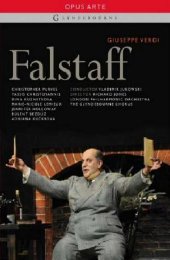
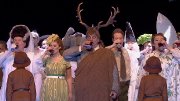
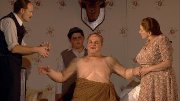
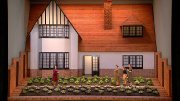
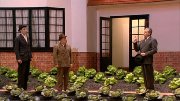
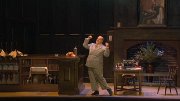
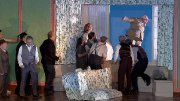
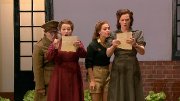
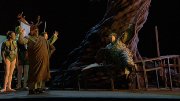
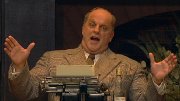







































Your Opinions and Comments
Be the first to post a comment!